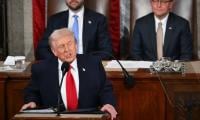Intel agencies operating without oversight, coordination
ISLAMABAD: Pakistan is a unique country whose intelligence agencies are not only operating without any established oversight mechanism but also have no system of working coordination among them, which is direly required today to check terrorism.
Although, the proposed setting up of the Joint Intelligence Directorate under Nacta (National Counter Terrorism Authority) by the government may pave way for the much-needed coordination to check terrorism, there is nothing under consideration to keep the agencies under check through a formal oversight mechanism.
Almost 27 years back, a high-level commission called the Air Chief Marshal Zulfiqar Ali Khan Commission was set up by the then government of Benazir Bhutto to evolve a system for the agencies’ oversight but none of the governments could get the recommendations of the body implemented.
In the absence of the oversight system, these agencies in the past have been involved in politics, in the making and breaking of governments and political parties. This situation also led to non-existence of any coordination system among them. Instead, these agencies have been found involved in rivalries.
The Air Chief Marshal Zulfiqar Ali Khan Commission had recommended a two-tier oversight mechanism for the spy agencies, including the ISI and the IB, but the proposed system remained unimplemented for the last 27 years.
The commission had recommended formation of a prime minister-led National Security Council and setting up of Joint Intelligence Committee to ensure that the intelligence agencies operate within the parameters of their respective legal mandate.
These proposed institutions were also considered vital to ensure necessary coordination among the intelligence agencies.
What Pakistani badly feel today was recommended by the Commission in 1989. It had proposed: “In order to ensure that the entire intelligence activity at the national level receives a unified policy direction and there is coordination between various intelligence agencies, it is considered necessary that a Standing Committee of the Cabinet is created for the purpose on the pattern of those existing in the UK, USA, Germany, France, India and Israel.”
The Commission had said such a committee might be called "National Security Council" (NSC) and comprises Prime Minister as its chairman and with members including Foreign Minster, Defence Minister, Interior Minister, Finance Minister, Chiefs of three armed forces and chairman of the proposed Joint Intelligence Committee.
The Commission had formally requested that the NSC might be entrusted the following tasks:
“a. Formulate Intelligence objectives and monitor their implementation by intelligence and security agencies.
b. Convert inputs received from intelligence into government policy.
c. Ensure that Federal and Provincial resources are harnessed to promote intelligence policy.
d. Review and coordinate intelligence policy.
e. Deliberate and decide on extra-sensitive national issues which cannot be discussed at any other forum.”
About the Joint Intelligence Committee, the Commission had submitted: “A Joint Intelligence Committee (JIC) may be created to: - a. Steer Intelligence functions within the framework of the policy directives of the NSC. b. Approve details of Intelligence policies in the light of the overall Intelligence objectives
evolved by NSC. c. Coordinate the working of Intelligence agencies in the country. d. Direct and monitor Intelligence research and analysis at the national level. e. Monitor Civil Aviation security at national level.”
It was also suggested: “a. A disinformation Cell may be established as the integral part of JIC. b. The functional control of the National Intelligence Academy (newly proposed, details discussed later) be vested in JIC. c. Consideration may be given to the development of the existing Technical Support Bureau of ISI into a National Technical Agency and its placement under JIC.”
The Commission report had said the membership of JIC may comprise Chairman JIC (to be a whole-time cabinet-level appointment. He would also be Prime Minister’s Principal Adviser on Intelligence and Security) and members including secretary foreign affairs, secretary defence, secretary interior, secretary finance, Director IB, DG ISI and secretary JIC.
The report was also of the view that the Joint Intelligence Committee may be provided a permanent secretariat (JIC Sectt.) to be headed by a Secretary who may be a serving or retired officer of vast all-round administrative experience with deep interest on intelligence work.
The Commission had also noted that the two major national level Intelligence agencies — Intelligence Bureau and ISI — may continue to function as such.
It was said that their heads should retain the right of direct access to the head of the government on Intelligence and Security matters of national urgency. However, their roles and functions need to be clearly defined and demarcated.
-
 Prince William Plans For Monarchy Revealed As He Gears Up For ‘big Changes’
Prince William Plans For Monarchy Revealed As He Gears Up For ‘big Changes’ -
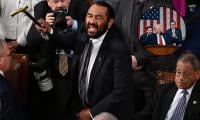 Rep. Al Green Removed From House Chamber During Trump’s State Of Union Address: Here’s What Happened
Rep. Al Green Removed From House Chamber During Trump’s State Of Union Address: Here’s What Happened -
 Bill Gates Breaks Silence On Epstein Links, ‘took Responsibility For His Actions’ During Town Hall Meeting
Bill Gates Breaks Silence On Epstein Links, ‘took Responsibility For His Actions’ During Town Hall Meeting -
 Christina Applegate Struggles To Leave Bed Amid Multiple Sclerosis Battle
Christina Applegate Struggles To Leave Bed Amid Multiple Sclerosis Battle -
 Matthew McConaughey, Timothée Chalamet Predict AI Actors May Compete At Oscars By 2028
Matthew McConaughey, Timothée Chalamet Predict AI Actors May Compete At Oscars By 2028 -
 Princess Eugenie Appears Unfazed By Andrew Drama In First Outing Since His Arrest
Princess Eugenie Appears Unfazed By Andrew Drama In First Outing Since His Arrest -
 Gucci Faces Backlash For Using AI In New Spring Collection
Gucci Faces Backlash For Using AI In New Spring Collection -
 Prince Harry, Meghan Markle Announce New Humanitarian Trip To Jordan
Prince Harry, Meghan Markle Announce New Humanitarian Trip To Jordan -
 Prince Harry Is In All Out War With Meghan For Lilibet: It’s More Than The Sussexes Could Ever Generate’
Prince Harry Is In All Out War With Meghan For Lilibet: It’s More Than The Sussexes Could Ever Generate’ -
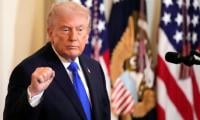 President Donald Trump Delivers The Traditional State Of The Union Address To Congress
President Donald Trump Delivers The Traditional State Of The Union Address To Congress -
 Kyle Connor Focuses On Jets' NHL Season After Skipping Trump's White House Invite
Kyle Connor Focuses On Jets' NHL Season After Skipping Trump's White House Invite -
 Why Prince William Grew Concerned About Meghan Markle's Conduct Shortly After Her Royal Wedding With Harry?
Why Prince William Grew Concerned About Meghan Markle's Conduct Shortly After Her Royal Wedding With Harry? -
 Trent Williams Future With San Francisco 49ers Uncertain Ahead Of NFL Season
Trent Williams Future With San Francisco 49ers Uncertain Ahead Of NFL Season -
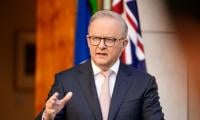 Australia: Bomb Threat Behind Evacuation Of PM Anthony Albanese Linked To Chinese Dance Group
Australia: Bomb Threat Behind Evacuation Of PM Anthony Albanese Linked To Chinese Dance Group -
 Rachel Reid Delays Release Of 'Heated Rivalry' Sequel 'Unrivaled' Due To Health Struggles
Rachel Reid Delays Release Of 'Heated Rivalry' Sequel 'Unrivaled' Due To Health Struggles -
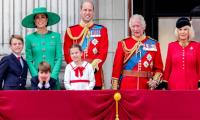 British Royals ‘not Appreciated’ In Modern World, Says Author
British Royals ‘not Appreciated’ In Modern World, Says Author

